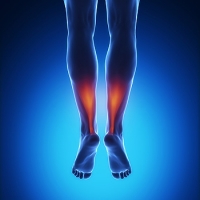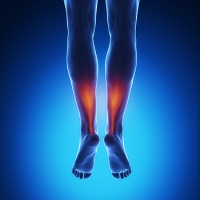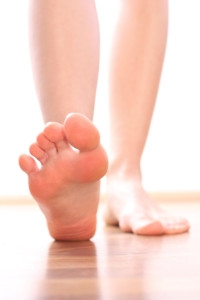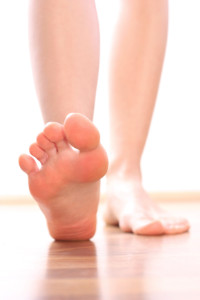
Blog (816)
Podiatrists Specialize in Common Foot Conditions
 The proper name for a doctor who specializes in foot and ankle disorders is known as a podiatrist. The technical term is a doctor of podiatric medicine, and the letters “DPM” follow the doctor’s name. The education that is needed to pursue this form of medicine consists of four years of medical school after obtaining a bachelor's degree. Residency training will take approximately three years, and this is accomplished in hospitals and clinics. Some of the specialties podiatrists are qualified for can include wound care, treating diabetic foot conditions, and performing foot surgery. Common foot conditions many patients seek the expertise of a podiatrist can consist of bunions, hammertoes, heel pain, and various foot infections. If pursuing a career in podiatry is of interest, it is suggested that you speak with a podiatrist who can address any questions you may have.
The proper name for a doctor who specializes in foot and ankle disorders is known as a podiatrist. The technical term is a doctor of podiatric medicine, and the letters “DPM” follow the doctor’s name. The education that is needed to pursue this form of medicine consists of four years of medical school after obtaining a bachelor's degree. Residency training will take approximately three years, and this is accomplished in hospitals and clinics. Some of the specialties podiatrists are qualified for can include wound care, treating diabetic foot conditions, and performing foot surgery. Common foot conditions many patients seek the expertise of a podiatrist can consist of bunions, hammertoes, heel pain, and various foot infections. If pursuing a career in podiatry is of interest, it is suggested that you speak with a podiatrist who can address any questions you may have.
If you are experiencing pain in the feet or ankles, don’t join the stubborn majority refusing treatment. Feel free to contact Dr. Kenneth Donovan from Advanced Care Foot and Ankle. Our doctor can provide the care you need to keep you pain-free and on your feet.
What Is a Podiatrist?
Someone would seek the care of a podiatrist if they have suffered a foot injury or have common foot ailments such as heal spurs, bunions, arch problems, deformities, ingrown toenails, corns, foot and ankle problems, etc.
Podiatric Treatment
A podiatrist will treat the problematic areas of the feet, ankle or lower leg by prescribing the following:
- Physical therapy
- Drugs
- Orthotic inserts or soles
- Surgery on lower extremity fractures
A common podiatric procedure a podiatrist will use is a scanner or force plate which will allow the podiatrist to know the designs of orthotics. Patients are then told to follow a series of tasks to complete the treatment. The computer will scan the foot a see which areas show weight distribution and pressure points. The podiatrist will read the analysis and then determine which treatment plans are available.
If you have any questions please feel free to contact one of our offices located in Warren, Livingston, and Toms River, NJ . We offer the newest diagnostic and treatment technologies for all your foot and ankle needs.
Do Your Child’s Feet Hurt?
Do Your Child's Feet Hurt?
Can Falling Be Prevented?
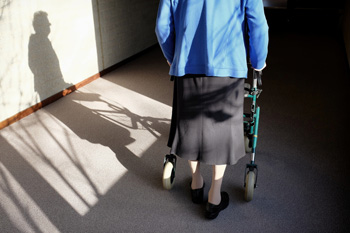 Injuries that happen as a result of falling is a common occurrence. They can be severe, and can cause broken bones in the feet, which can inhibit completing daily activities. There are methods that can be implemented which can help to prevent unnecessary falls. These can include performing simple stretches that can strengthen the body, and improving lighting in the living environment. Additionally, it is beneficial to have regular physical examinations, as this is helpful in monitoring existing medications. Many patients have installed grab bars in the shower and toilet areas, and using a bathmat can lessen the fear of falling while showering. If you would like more information about how falling can impact the feet, and effective preventive techniques, please consult with a podiatrist.
Injuries that happen as a result of falling is a common occurrence. They can be severe, and can cause broken bones in the feet, which can inhibit completing daily activities. There are methods that can be implemented which can help to prevent unnecessary falls. These can include performing simple stretches that can strengthen the body, and improving lighting in the living environment. Additionally, it is beneficial to have regular physical examinations, as this is helpful in monitoring existing medications. Many patients have installed grab bars in the shower and toilet areas, and using a bathmat can lessen the fear of falling while showering. If you would like more information about how falling can impact the feet, and effective preventive techniques, please consult with a podiatrist.
Preventing falls among the elderly is very important. If you are older and have fallen or fear that you are prone to falling, consult with Dr. Kenneth Donovan from Advanced Care Foot and Ankle. Our doctor will assess your condition and provide you with quality advice and care.
Every 11 seconds, an elderly American is being treated in an emergency room for a fall related injury. Falls are the leading cause of head and hip injuries for those 65 and older. Due to decreases in strength, balance, senses, and lack of awareness, elderly persons are very susceptible to falling. Thankfully, there are a number of things older persons can do to prevent falls.
How to Prevent Falls
Some effective methods that older persons can do to prevent falls include:
- Enrolling in strength and balance exercise program to increase balance and strength
- Periodically having your sight and hearing checked
- Discuss any medications you have with a doctor to see if it increases the risk of falling
- Clearing the house of falling hazards and installing devices like grab bars and railings
- Utilizing a walker or cane
- Wearing shoes that provide good support and cushioning
- Talking to family members about falling and increasing awareness
Falling can be a traumatic and embarrassing experience for elderly persons; this can make them less willing to leave the house, and less willing to talk to someone about their fears of falling. Doing such things, however, will increase the likelihood of tripping or losing one’s balance. Knowing the causes of falling and how to prevent them is the best way to mitigate the risk of serious injury.
If you have any questions, please feel free to contact one of our offices located in Warren, Livingston, and Toms River, NJ . We offer the newest diagnostic and treatment technologies for all your foot care needs.
What to Expect During Achilles Tendon Surgery Recovery
Some Achilles tendon injuries such as ruptures or tears may not respond to nonsurgical care. In some patients, surgery may be an option to repair the tendon and restore its functionality and strength. There are different methods a podiatric surgeon can use which may be performed as outpatient (same-day) surgery. While in recovery, it is important to follow your podiatrist’s instructions. Pain medicine may be suggested or prescribed during the first few days following the procedure. Crutches—and keeping your leg elevated as much as possible—will help keep weight off of your leg to reduce pain and swelling. When your stitches are ready to be removed, your podiatrist will fit you with a removable boot or cast. They will also assess when the time is right to start putting weight on your leg and how you can help strengthen your ankle and leg muscles. Full recovery may take weeks or months, depending on a variety of factors.
Achilles tendon injuries need immediate attention to avoid future complications. If you have any concerns, contact Dr. Kenneth Donovan of Advanced Care Foot and Ankle. Our doctor can provide the care you need to keep you pain-free and on your feet.
What Is the Achilles Tendon?
The Achilles tendon is a tendon that connects the lower leg muscles and calf to the heel of the foot. It is the strongest tendon in the human body and is essential for making movement possible. Because this tendon is such an integral part of the body, any injuries to it can create immense difficulties and should immediately be presented to a doctor.
What Are the Symptoms of an Achilles Tendon Injury?
There are various types of injuries that can affect the Achilles tendon. The two most common injuries are Achilles tendinitis and ruptures of the tendon.
Achilles Tendinitis Symptoms
- Inflammation
- Dull to severe pain
- Increased blood flow to the tendon
- Thickening of the tendon
Rupture Symptoms
- Extreme pain and swelling in the foot
- Total immobility
Treatment and Prevention
Achilles tendon injuries are diagnosed by a thorough physical evaluation, which can include an MRI. Treatment involves rest, physical therapy, and in some cases, surgery. However, various preventative measures can be taken to avoid these injuries, such as:
- Thorough stretching of the tendon before and after exercise
- Strengthening exercises like calf raises, squats, leg curls, leg extensions, leg raises, lunges, and leg presses
If you have any questions please feel free to contact one of our offices located in Warren, Livingston, and Toms River, NJ . We offer the newest diagnostic tools and technology to treat your foot and ankle needs.
What to Expect During Achilles Tendon Surgery Recovery
Some Achilles tendon injuries such as ruptures or tears may not respond to nonsurgical care. In some patients, surgery may be an option to repair the tendon and restore its functionality and strength. There are different methods a podiatric surgeon can use which may be performed as outpatient (same-day) surgery. While in recovery, it is important to follow your podiatrist’s instructions. Pain medicine may be suggested or prescribed during the first few days following the procedure. Crutches—and keeping your leg elevated as much as possible—will help keep weight off of your leg to reduce pain and swelling. When your stitches are ready to be removed, your podiatrist will fit you with a removable boot or cast. They will also assess when the time is right to start putting weight on your leg and how you can help strengthen your ankle and leg muscles. Full recovery may take weeks or months, depending on a variety of factors.
Achilles tendon injuries need immediate attention to avoid future complications. If you have any concerns, contact Dr. Kenneth Donovan of Advanced Care Foot and Ankle. Our doctor can provide the care you need to keep you pain-free and on your feet.
What Is the Achilles Tendon?
The Achilles tendon is a tendon that connects the lower leg muscles and calf to the heel of the foot. It is the strongest tendon in the human body and is essential for making movement possible. Because this tendon is such an integral part of the body, any injuries to it can create immense difficulties and should immediately be presented to a doctor.
What Are the Symptoms of an Achilles Tendon Injury?
There are various types of injuries that can affect the Achilles tendon. The two most common injuries are Achilles tendinitis and ruptures of the tendon.
Achilles Tendinitis Symptoms
- Inflammation
- Dull to severe pain
- Increased blood flow to the tendon
- Thickening of the tendon
Rupture Symptoms
- Extreme pain and swelling in the foot
- Total immobility
Treatment and Prevention
Achilles tendon injuries are diagnosed by a thorough physical evaluation, which can include an MRI. Treatment involves rest, physical therapy, and in some cases, surgery. However, various preventative measures can be taken to avoid these injuries, such as:
- Thorough stretching of the tendon before and after exercise
- Strengthening exercises like calf raises, squats, leg curls, leg extensions, leg raises, lunges, and leg presses
If you have any questions please feel free to contact one of our offices located in Warren, Livingston, and Toms River, NJ . We offer the newest diagnostic tools and technology to treat your foot and ankle needs.
What to Do If Your Child’s Feet Sweat Constantly
Hyperhidrosis is a condition where overactive sweat glands cause an individual to sweat excessively in certain areas of the body, including the feet. If your child’s feet sweat profusely—even if your child is not hot or doing something strenuous—or their feet regularly emit an unpleasant odor, they may have hyperhidrosis. This condition can be quite uncomfortable, embarrassing, disruptive to normal activities, and may even make them more prone to developing a fungal infection due to continuously wet skin. Hyperhidrosis can be caused by physical stress or anxiety, certain medications, infections, fever, or even an underlying medical condition. You may be able to help your child manage the symptoms of hyperhidrosis by having them keep their feet clean, applying cornstarch or powder, choosing breathable materials in shoes, and wearing cotton socks that are switched out regularly. If these practices do not offer adequate relief, a podiatrist may be able treat your child’s hyperhidrosis with various procedures and medicinal therapies.
The health of a child’s feet is vital to their overall well-being. If you have any questions regarding foot health, contact Dr. Kenneth Donovan of Advanced Care Foot and Ankle. Our doctor can provide the care you need to keep you pain-free and on your feet.
Tips for Keeping Children's Feet Healthy
- Make sure their shoes fit properly
- Look for any signs of in-toeing or out-toeing
- Check to see if they have Clubfoot (condition that affects your child’s foot and ankle, twisting the heel and toes inward) which is one of the most common nonmajor birth defects.
- Lightly cover your baby’s feet (Tight covers may keep your baby from moving their feet freely, and could prevent normal development)
- Allow your toddler to go shoeless (Shoes can be restricting for a young child’s foot)
- Cut toenails straight across to avoid ingrown toenails
- Keep your child’s foot clean and dry
- Cover cuts and scrapes. Wash any scratches with soap and water and cover them with a bandage until they’ve healed.
If you have any questions, please feel free to contact one of our offices located in Warren, Livingston, and Toms River, NJ . We offer the newest diagnostic and treatment technologies for all your foot care needs.
Wounds That Don’t Heal Need to Be Checked
Wounds That Don't Heal Need to Be Checked
When Is Joint Replacement Surgery an Option?
When damage or disease in a joint does not improve or respond to conservative treatment, joint replacement surgery may be an option to help the patient feel and move better. In joint replacement surgery, damaged or diseased joints are replaced with fabricated parts in an effort to help the joint work better, while relieving pain and increasing or restoring mobility. Joint replacement surgery can typically be performed on many different joints in the body, including the joints in the ankles and big toes. These prosthetic joints can last many years. If you are suffering from joint pain in your feet or ankles, contact a podiatrist to see if you are a good candidate for joint replacement surgery.
In certain cases, in which the patient suffers from extreme pain or damage in a joint, joint replacement surgery may be deemed useful. If you have constant pain in a foot joint, consult with Dr. Kenneth Donovan from Advanced Care Foot and Ankle. Our doctor will assess your condition and provide you with quality foot and ankle treatment.
What Is Joint Replacement Surgery?
Over time, joints wear down; this can be exacerbated by diseases and conditions. Joint replacement surgery, also known as arthroplasty, is when a damaged joint is surgically removed and replaced with a prosthesis. Prostheses, which can be made of ceramic, plastic, or metal, act as joints in lieu of an actual joint. One of the most prevalent causes for joint replacement is arthritis.
Arthritis in the Foot
Arthritis can occur in any joint in the body, including in the feet. Common types of arthritis in the foot are osteoarthritis, rheumatoid arthritis, and gout. The big toe is usually where arthritis occurs in the foot; this is known as hallux rigidus.
Joint Replacement Surgery in the Foot
The most common form of joint replacement in the foot is a first metatarsophalangeal (MTP) joint placement. MTP joint replacement surgery is designed to treat hallux rigidus. Surgery is not intensive, and recovery occurs within one to two months after the procedure has been done. Overall, joint replacement surgery is a safe and effective way to treat pain in the joint of the foot.
If you have any questions, please feel free to contact one of our offices located in Warren, Livingston, and Toms River, NJ . We offer the newest diagnostic and treatment technologies for all your foot care needs.





